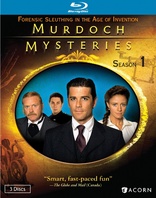Murdoch Mysteries: Season 1 Blu-ray Movie
HomeMurdoch Mysteries: Season 1 Blu-ray Movie 
Acorn Media | 2008 | 624 min | Not rated | Apr 17, 2012Price
List price:Amazon: $29.99 (Save 50%)
Third party: $29.99 (Save 50%)
Only 1 left in stock (more on the way).
Movie rating
7.6 | / 10 |
Blu-ray rating
| Users | 0.0 | |
| Reviewer | 4.0 | |
| Overall | 4.0 |
Overview
Murdoch Mysteries: Season 1 (2008)
Set in Toronto in the 1890s, Murdoch Mysteries explores the intriguing world of William Murdoch, a handsome young detective using radical forensic techniques including fingerprinting and trace evidence, to solve some of the city's most gruesome murders. Though his unconventional approach elicits ridicule from fellow officers and scepticism from his boss, Inspector Brackenreid, Murdoch is often the only one who can crack the case.
Starring: Yannick Bisson, Hélène Joy, Thomas Craig, Jonny Harris, Georgina ReillyDirector: Megan Follows, Yannick Bisson, Norma Bailey, T.W. Peacocke, Katie Boland
| Period | Uncertain |
| Crime | Uncertain |
| Mystery | Uncertain |
| Action | Uncertain |
Specifications
Video
Video codec: MPEG-4 AVC
Video resolution: 1080p
Aspect ratio: 1.78:1
Original aspect ratio: 1.78:1
Audio
English: Dolby Digital 2.0 (256 kbps)
Not PCM 2.0, as package states
Subtitles
English SDH
Discs
50GB Blu-ray Disc
Three-disc set (3 BDs)
Packaging
Slipcover in original pressing
Playback
Region A (B, C untested)
Review
Rating summary
| Movie | 4.0 | |
| Video | 4.0 | |
| Audio | 3.5 | |
| Extras | 2.0 | |
| Overall | 4.0 |
Murdoch Mysteries: Season 1 Blu-ray Movie Review
Who's to Blame in Canada?
Reviewed by Michael Reuben April 9, 2012Acorn Media is playing catch-up again, but it's a small gap to close. The unique Canadian police drama, Murdoch Mysteries—set in the late 19th Century and featuring a soft-spoken but resolute police detective who invents modern forensics as he goes along—made its Blu-ray debut in 2011 with Season 3, after two seasons had already appeared on DVD. Acorn is now returning to the beginning and issuing Season 1 on Blu-ray, even as it prepares to release Season 4 on Blu-ray and DVD simultaneously later this year. (Season 5 is currently airing in Canada, and Season 6 is planned for 2013, though on a different network.) Murdoch Mysteries is based on a series of crime novels by Maureen Jennings, who continues to act as an advisor to the TV show. It was Jennings who conceived of Det. William Murdoch as a kind of Sherlock Holmes with a badge. (Holmes is one of Murdoch's heroes.) Still, despite Murdoch's official status, he remains an outsider and eccentric in the Toronto constabulary of the 1890s. For one thing, Murdoch is a Catholic in an otherwise intensely Protestant city; he crosses himself whenever he first encounters a murder victim. Then there's Murdoch's preference for heavy scientific tomes on obscure subjects as light reading, and his habit of answering simple questions at length, parsing his responses with the precision one might expect from a bright student taught by Jesuit priests. A man like Murdoch would never have made detective if his strange methods didn't so often produce results. Three TV movies, based directly on Jennings' novels, aired in 2004-2005. These were successful enough to inspire a weekly series with original stories (and an entirely new cast). The first season of thirteen episodes aired from January 24 through April 17, 2008, and further seasons have followed annually. The show has been shown in the U.S. on PBS and in countries around the world from France to Thailand.
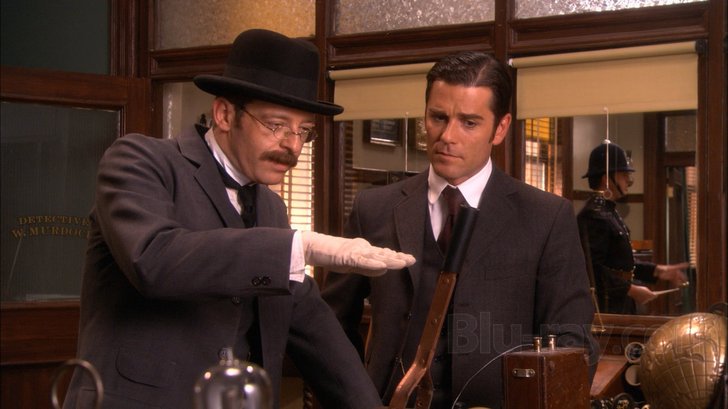
Tesla and Murdoch
Like many of its urban counterparts in the U.S., the Toronto of the 1890s had advanced far beyond a frontier town, but it was still a work in progress with a bustling sense of activity and potential. It was also a melting pot, and some of that diversity is reflected in Murdoch Mysteries' regular cast. Det. Murdoch (Yannick Bisson), reserved and almost courtly, relocated to Toronto from Eastern Canada after spending a few years working as a logger. Murdoch's family background is explored during an episode when his father, whom he hasn't seen since he was a boy, unexpectedly appears in Toronto. (To avoid spoilers, I'm not identifying the episode.) Murdoch's usual sidekick is Constable George Crabtree (Jonny Harris), who is originally from Newfoundland. Crabtree admires Murdoch but frequently can't follow his reasoning. He nevertheless makes himself indispensable by paying close attention and following through on Murdoch's instructions. (Crabtree also provides much of the comic relief, and Harris plays the part to perfection.) Their boss is Inspector Brackenreid (Thomas Craig), a former English soldier whose thick Yorkshire accent hasn't been dulled by his years in Canada. Nor has his temper been cooled, especially when Murdoch insists on complicating what appears to be an open-and-shut case with a lot of questions about "loose ends". With his hard drinking and his impatient style, Brackenreid joins a line of tough, pragmatic police officials whose most famous representative is Life on Mars's DCI Gene Hunt. The final regular cast member is a rare breed for the period, a female coroner, Dr. Julia Ogden (Hélène Joy). Daughter of a socially prominent Toronto family, the doctor chose not to follow the usual path of tea parties and a suitable marriage, opting instead for a career in medicine as a single woman. All of this makes Dr. Ogden as much an oddball as Murdoch, and the two are clearly meant for each other, even though significant factors conspire to keep them apart. It should tell you something about the wit and comedic style of Murdoch Mysteries that many of its most achingly romantic encounters occur in Dr. Ogden's antiseptically white examining room over the bloody viscera of some unfortunate murder victim. The season's opening episode, "Power", launches the series with a concentrated dose of its typical elements. It revolves around a real event in technological history: the shift from direct current (DC) to alternating current (AC). As with all such changes, significant profits rested on the outcome, and the proponents of DC, who included Thomas Edison, arranged public demonstrations intended to highlight the risks of AC to the public by electrocuting small animals. At one such demonstration in Toronto, an accident occurs, and a person is electrocuted, but Murdoch, who has been following the controversy with interest, determines that the equipment was tampered with. Suspicion initially falls on Nikola Tesla (Dmitry Chepovetsky), the famous Serbian-American developer of AC, who was formerly Edison's colleague and is now his rival, but Murdoch quickly discovers other elements at play. Indeed, Tesla's help proves essential to solving the case. The scenes between Tesla, the professional scientist, and Murdoch, the devoted amateur, are slyly written to the contemporary viewer's knowledge of what's to come. (The two men conceive the idea of television in about fifteen seconds, down to the name itself.) These neatly constructed intersections with actual history are a big part of the show's appeal. Another historical figure who appears several times in Season 1 is Sir Arthur Conan Doyle (Geraint Wyn Davies), who, at least according to the show's writers, got the idea for The Hound of the Baskervilles from Inspector Brackenreid. Real issues as well as real people make their presence felt. As with all the best historical fiction, the past serves as a storyteller's filter through which to view the present. In episode 2, "The Knockdown", a professional boxer is found dead, shot at close range, with his wife standing over him holding the gun. For Brackenreid the case is obvious, but Murdoch points out that the wife's clothing has no blood splatter consistent with a close range entry wound. After proving his point with a demonstration worthy of Dexter Morgan (it involves a freshly killed pig from the butcher), Murdoch focuses on the fighter's recent activities. An African-American, he had just knocked out the local favorite, who is white and didn't take the loss well. Neither did the local audience. The case in episode 5, "'Til Death Do Us Part", causes Murdoch much inner turmoil. A groom is killed in the church on his wedding day, and the investigation reveals that he may have led a secret and guarded life as a homosexual (the term was just then coming into use). Murdoch finds himself struggling to remain objective in the face of a phenomenon condemned by everything in his Catholic upbringing. He is even more conflicted when he discovers that the victim's pastor may have known his true nature. Episode 10, "Child's Play", touches on the perennial issue of proper oversight when poor or orphaned children are placed in foster care. Episode 11, "Bad Medicine", foreshadows the medical profession's many 20th Century missteps in valuing scientific progress over the welfare of individual patients. Episode 8, "Still Waters", turns on class conflict between rich and poor; it also features Murdoch's attempt to create a lie detector. And Episode 12, "The Prince and the Rebel", which was clearly inspired by Patriot Games, uses the occasion of a state visit by Queen Victoria's grandson, Prince Alfred (Chad Connell), to examine the then-current state of the "Irish problem", which wouldn't be resolved for over 100 years. Since the name "Murdoch" is Irish, the case becomes particularly personal for the usually detached detective. But perhaps the season's wittiest episode is its conclusion, entitled "The Annoying Red Planet", in which a recluse (Robert Racki) who believed Martians were after him is found in a tree with his neck broken, and no one, not even Murdoch, can explain how he got there, since there are no footprints or other traces of human agency. Crop circles, eviscerated cattle, UFOs and other classic signs of alien presence continue to appear, and all the while Murdoch plays the skeptical Scully, proposing rational explanations, while Crabtree and Dr. Ogden make it clear that they want to believe. That the Canadian equivalent of an X-file is involved is confirmed when an order comes down from the highest level of Her Majesty's government. A vast conspiracy is indeed at work. Pay close attention, and you'll catch a few familiar references.
Murdoch Mysteries: Season 1 Blu-ray Movie, Video Quality 
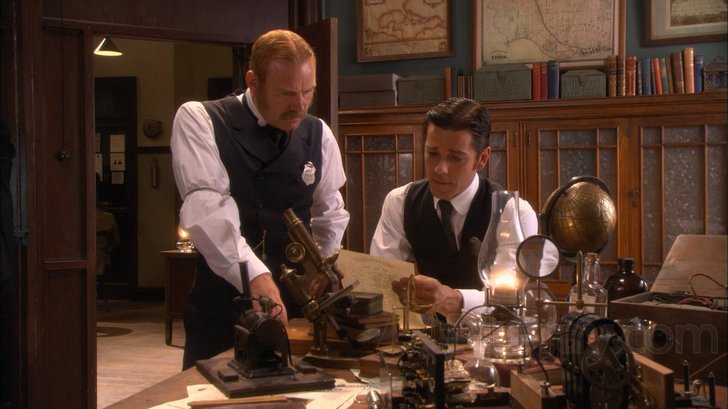
Murdoch Mysteries is shot on hi-def video, and the style is deliberately bright and slightly overlit to create the opposite effect of a sepia-toned, period style. Acorn Media's 1080p, AVC-encoded Blu-ray image is consistently clean, clear and well-detailed, so much so that you can routinely pick out individual fibres in clothing, pores in faces and anachronistic product markings in the production design (a point made repeatedly in the commentary on episode 1). Blacks are solid and deep (for a TV show), and degrees of black are well-differentiated, so that scenes with darkened areas (e.g., Tesla's lab) exhibit good shadow detail. The only criticism, and it's a minor one, is an occasional occurrence of video noise. This is probably a leftover from digital post-processing, and it's generally fleeting, but it does pop up from time to time.
Murdoch Mysteries: Season 1 Blu-ray Movie, Audio Quality 
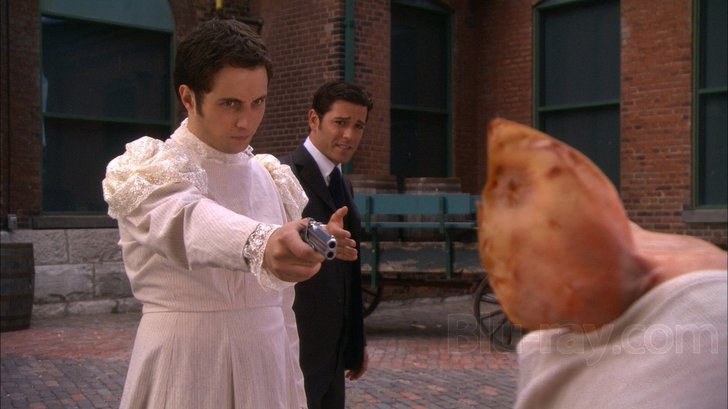
It wasn't until I'd watched about half of season 1 that I noticed its 2.0 audio track wasn't the PCM 2.0 listed on the disc jacket. Murdoch Mysteries is shown in stereo surround, and the Blu-ray release of Season 3 had PCM 2.0 sound, but for some reason Season 1 has DD 2.0 at 256 kbps (which, at least, is an improvement over the anemic 192 kbps usually found on DVD). That the lossy track didn't call attention to itself before then is an indication of how well it does its job, reproducing dialogue and effects clearly and blending them effectively with the distinctive score by Robert Carli.
Murdoch Mysteries: Season 1 Blu-ray Movie, Special Features and Extras 
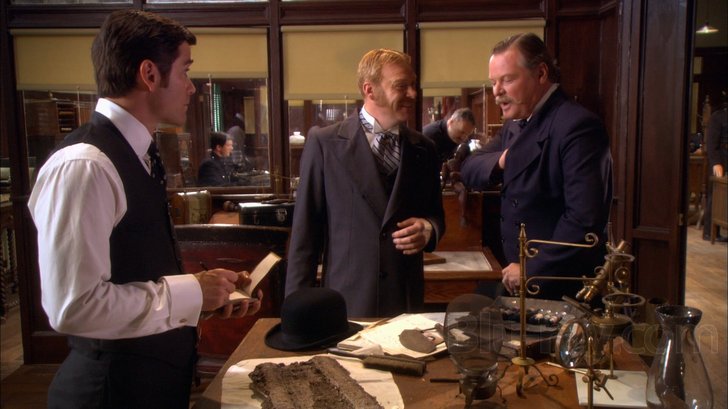
- Commentary on Episode 1 by Executive Producer Cal Coons, Actors Yannick Bisson and Jonny Harris and Production Designer Sandra Kybartas (disc 1): Coons, who is the showrunner, leads a lively and informative discussion that provides an intriguing look inside the process of creating a "pre-modern" police procedural. For example, Coons and Kybartas note that many of the instruments and inventions used by Murdoch and Nikola Tesla are authentic and therefore worn with age, whereas realistically they should look new. But when they tried to incorporate objects with fresh wood and shiny metal, it just didn't look right. Also of note is that this episode, "Power", which works so effectively as a pilot, was originally conceived to fall much later in the season.
- Character Biographies (disc 3): Brief summaries of the background of the four main characters. These don't contain anything beyond what one learns from the episodes.
- Behind the Scenes Photo Gallery (disc 3) (HD, 1080p; various): Fourteen photos with helpful captions identifying those pictured.
- Interviews (disc 3) (SD, 480i; 1.78:1, non-enhanced; 17:26)
- Yannick Bisson
- Hélène Joy
- Thomas Craig
- Jonny Harris
- Maureen Jennings
- Additional Trailers: At startup, disc 1 plays trailers for Acorn Media, Going Postal and Bonekickers. These can be skipped with the chapter forward button and are not otherwise available once the disc loads.
Murdoch Mysteries: Season 1 Blu-ray Movie, Overall Score and Recommendation 

I grew up on police procedurals, going all the way back to the original Dragnet, and they've never lost their attraction. But I don't find every variation of the genre equally gripping, and the technocratic version pioneered by CSI doesn't appeal. Murdoch Mysteries is the perfect antidote, because it catches forensic science in its infancy, when it was still too primitive and undeveloped to function without the aid of traditional policework. Det. Murdoch may be a sleuth devoted to scientific method, but he still appreciates the value of talking to people and listening carefully to what they have to say. Highly recommended.
Other editions
Murdoch Mysteries: Other Seasons

Murdoch Mysteries: Season 2
2009

Murdoch Mysteries: Season 3
2010

Murdoch Mysteries: Season 4
2011

Murdoch Mysteries: Season 5
2012

Murdoch Mysteries: Season 6
2013

Murdoch Mysteries: Season 7
2013-2014

Murdoch Mysteries: Season 8
2014-2015

Murdoch Mysteries: Season 9
2015-2016

Murdoch Mysteries: A Merry Murdoch Christmas
2015

Murdoch Mysteries: Season 10
2016-2017

Murdoch Mysteries: Once Upon a Murdoch Christmas
2016

Murdoch Mysteries: Season 11
2017-2018

Murdoch Mysteries: Home for the Holidays
2017

Murdoch Mysteries: Season 12
2018-2019

Murdoch Mysteries: Season 13
2019-2020

Murdoch Mysteries: Season 14
2021

Murdoch Mysteries: Season 15
The Artful Detective
2021-2022

Murdoch Mysteries Season 16
2022-2023

Murdoch Mysteries: Season 17
The Artful Detective
2023-2024

Murdoch Mysteries: Season 18
The Artful Detective
2024-2025

Murdoch Mysteries Season 19
2025-2026
Similar titles
Similar titles you might also like
(Still not reliable for this title)

Poirot: Murder on the Orient Express
2010

The Raven
2012

The Night of the Generals
Limited Edition to 3000 - SOLD OUT
1967

Murder on the Orient Express 4K
50th Anniversary Edition
1974

Grantchester: Season Four
Masterpiece Mystery
2019

Copper: Season One
2012

Twisted
2004

Endeavour: Series 2
Masterpiece Mystery | Full UK-Length Edition
2014

Murder by Decree 4K
1979

Sherlock Holmes 4K
2009

Where the Truth Lies
2005

Foyle's War: Set 8
2014

Miss Fisher's Murder Mysteries Series 1-3 Collection
2012-2015

The Scarlet Claw
Sherlock Holmes
1944

Sherlock Holmes Faces Death
1943

In the Cut
20th Anniversary Uncut Director's Edition
2003

Miss Marple: Volume 1
The Murder at the Vicarage / The Body in the Library / The Moving Finger / A Murder is Announced
1984-1986

The Bletchley Circle
2012

Miss Fisher and the Crypt of Tears
2020

The Connection
La French
2014
